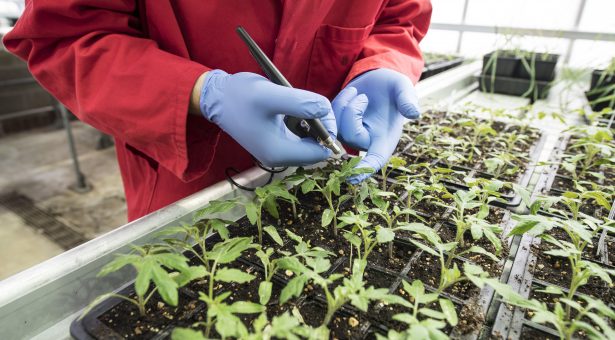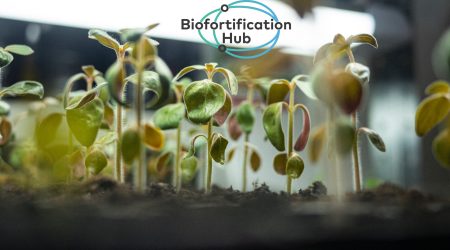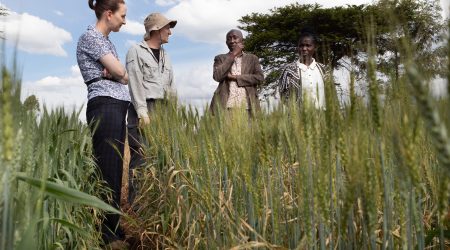Bridging the Agri-tech – biosciences gap from lab to industry

In January 2019, we introduced the Flexible Talent Mobility Award scheme (FTMA), which supports up to three-month work experience placements for scientists to experience life in industry and vice versa.
To find out how they work and why they might be beneficial, we sat down with one recipient of an FTMA, Pumi Perera, to find out about her experience.
Pumi came to the John Innes Centre to work on Arabidopsis in Professor Alison Smith’s group in our Metabolic Biology department. As the end of her contract approached, the FTMA programme inspired Pumi to follow her interest in working in the industrial sector.
Pumi undertook her three-month industry placement in Germains, an international seed treatment technology company, founded in Los Angeles back in 1871 and now featuring bases in the Netherlands, the USA and with us on the Norwich Research Park.
Despite having no previous experience in the seed treatment field, Pumi impressed her new colleagues with the skills she brought to the job, learned during her time in the lab.
During her placement, Pumi created and adapted new protocols for Germains’s treatment of beet seeds. Then, after waiting patiently for the plants to grow, she also carried out the first phase of experiments on the crop.
“There is still a lot of work to be done, but I’m glad to have had the opportunity to be part of the creation of Germains protocols during my time there.
To work in industry, I found that a lot of job advertisements asked for either industry experience or at least working knowledge of it, and I didn’t have those.
However, after the FTMA, I feel more confident about my chances of fulfilling those previous gaps in knowledge, as well as displaying my new adaptability skills in any new position or research programme”, Pumi told us.
On asked what she had learned, Pumi emphasised that it was both the dynamics and shift in focus that had left the biggest impressions;
“Working in a small team of three full-time and one part-time scientists including myself, was a nice environment. Coupled with the change in focus from Arabidopsis to Crop (beets) plants, and the speedy introduction it brought to agriculture, the whole process was stimulating.
Working at Germains has been a great experience, and a worthwhile step into the unknown, which I’ve enjoyed”.
We asked Pumi’s supervisor Dr Hamad Siddiqui what the view from industry was;
“Germains provided Pumi with every opportunity in which she could learn from industry, which may not have been available for her while working in academia.
She spent most of her time in our lab based on the Norwich Research Park, however, she also visited other sites including two factories, an R&D centre, Germains’s headquarters located in Kings Lynn, and the growth room facilities based in Wessington. She also visited different field sites where currently, we are conducting our field trials for future new products”.
“In my opinion, the FTMA initiative is mutually beneficial for both parties, and we benefited in hosting Pumi because she had the expertise in starch and sugar analysis. We would be happy to welcome more researchers in the future to work in Germains under this scheme”
Finally, in wishing Pumi well for the future, Dr Siddiqui said “I hope by using her experience working in Germains she can take an informed decision about whether working in industry is a good choice for her or not.
“I also would like to wish her all the best for her future life and take this opportunity to thank the John Innes Centre and BBSRC for providing us this opportunity to host Pumi”.
Now the placement has ended, Pumi is looking forward to spending some time at home in Sri Lanka, relaxing, and considering all her career options for her next endeavour.
Before the FTMA, only having research experience was proving to be a challenge when it came to meeting the essential criteria of many job vacancies, which is probably the most common sentiment echoed by all other FTMA secondees.
3-month placement opportunity
Following the successes of both FTMA1 and FTMA2 placement interchange programmes, we are pleased to announce a new opportunity to undertake a 3-month placement at Leaf Expression Systems on the Norwich Research Park.
The placement is likely to involve hands-on work with one or more commercial or internal product development activities including;
- Testing expression levels of new target proteins from agroinfiltrated N. Benthamiana leaf tissue
- Identifying suitable extraction and clarification conditions for that protein and development of a reliable and scalable process for chromatographic purification
- Protein characterisation using the above techniques and some degree of functional characterisation using plate-based in vitro assays
Due to the current Covid-19 situation, it is unlikely that Leaf would be able to host the placement until Q4 of 2020 at the earliest, with the latest start date being January 4 2021 to enable the placement to complete by the end of March 2021.



